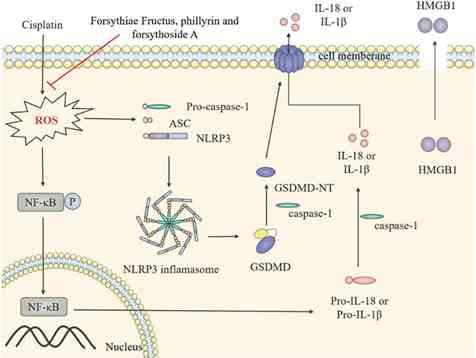Potential of Forsythiae Fructus in Mitigating Chemotherapy-Induced Gastrointestinal Inflammation and Nausea
已发布 26 十二月, 2023
Chemotherapy-induced nausea and vomiting (CINV) are among the most prevalent and distressing side effects faced by patients undergoing antineoplastic treatments. This condition can lead to complications such as dehydration, metabolic imbalances, anorexia and weakened physical stamina. Notably, highly emetic drugs such as cisplatin are notorious for causing severe nausea and vomiting in approximately 90% of patients. Therefore, enhancing the management of CINV is of utmost importance.
Chemotherapy-induced inflammation in the gastrointestinal tract is considered one of the potential pathological mechanisms of CINV. Forsythiae Fructus, or “lian qiao” in Chinese, has diverse biological activities, including antiemetic, anti-inflammatory, antioxidant, antiviral and neuroprotective properties. Derived from the dried fruit of Forsythia suspensa (Thunb.) Vahl, Forsythiae Fructus is a frequently used traditional Chinese medicine.
In a new study published in the Journal of Holistic Integrative Pharmacy, a team of researchers from the Guangdong Pharmaceutical University found that Forsythiae Fructus has CINV-attenuating properties. The researchers aimed to investigate the mechanism of chemotherapy-induced gastrointestinal inflammatory injury, focusing on epithelial cells pyroptosis using cisplatin-treated IEC-6 cells.
“Upon cisplatin stimulation, we observed an increase in ROS production and the activation and assembly of NLRP3 inflammasome,” shares Ke Nie, corresponding author of the study. “Once activated, the NLRP3 inflammasome recruit procaspase-1, leading to its activation, cleavage of GSDMD and subsequent formation of membrane pores. HMGB1 was released through these pores.”
Taken together, the findings indicate a strong connection between the development of gastrointestinal inflammation and intestinal epithelial cell pyroptosis induced by cisplatin. The researchers also evaluated the toxicity of cisplatin and LPS/ATP on J774A.1 macrophages and assessed the protective effect of Forsythiae Fructus extract, with results consistent with the aforementioned observations.
“Our study supports the idea that alleviating chemotherapy-induced gastrointestinal inflammation is a promising therapeutic approach against CINV,” says Nie. “Mechanistically, we found that the alleviating effect of Forsythiae Fructus and its primary components, phillyrin and forsythoside A, against cisplatin-induced cytotoxicity may be attributed to inhibiting oxidative stress, downregulating the NLRP3/caspase-1/GSDMD pathway, and inhibiting pyroptosis.”

Contact author name, affiliation, email address: Ke Nie. School of Chinese Materia Medica, Guangdong Pharmaceutical University, Guangzhou, China. nicknk@hotmail.com.
Funder: This work was supported by the Innovative Team Project of Ordinary Universities in Guangdong Province (No.2022KCXTD016) and the Key Subject Research Projects of Guangdong Province in 2019 (No.2019GDXK-0011).
Conflict of interest: The authors declare no potential conflicts of interest associated with this research. All listed authors have read and approved the submitted manuscript.
See the article: Ye B, Zhang R, Xian Y, et al. Forsythiae Fructus attenuates cisplatin-induced cytotoxicity in IEC-6 cells and J774A.1 macrophages by inhibiting NLRP3/caspase-1/GSDMD mediated pyroptosis. Journal of Holistic Integrative Pharmacy. 2023. 4(2):166-177.
https://doi.org/10.1016/j.jhip.2023.09.001